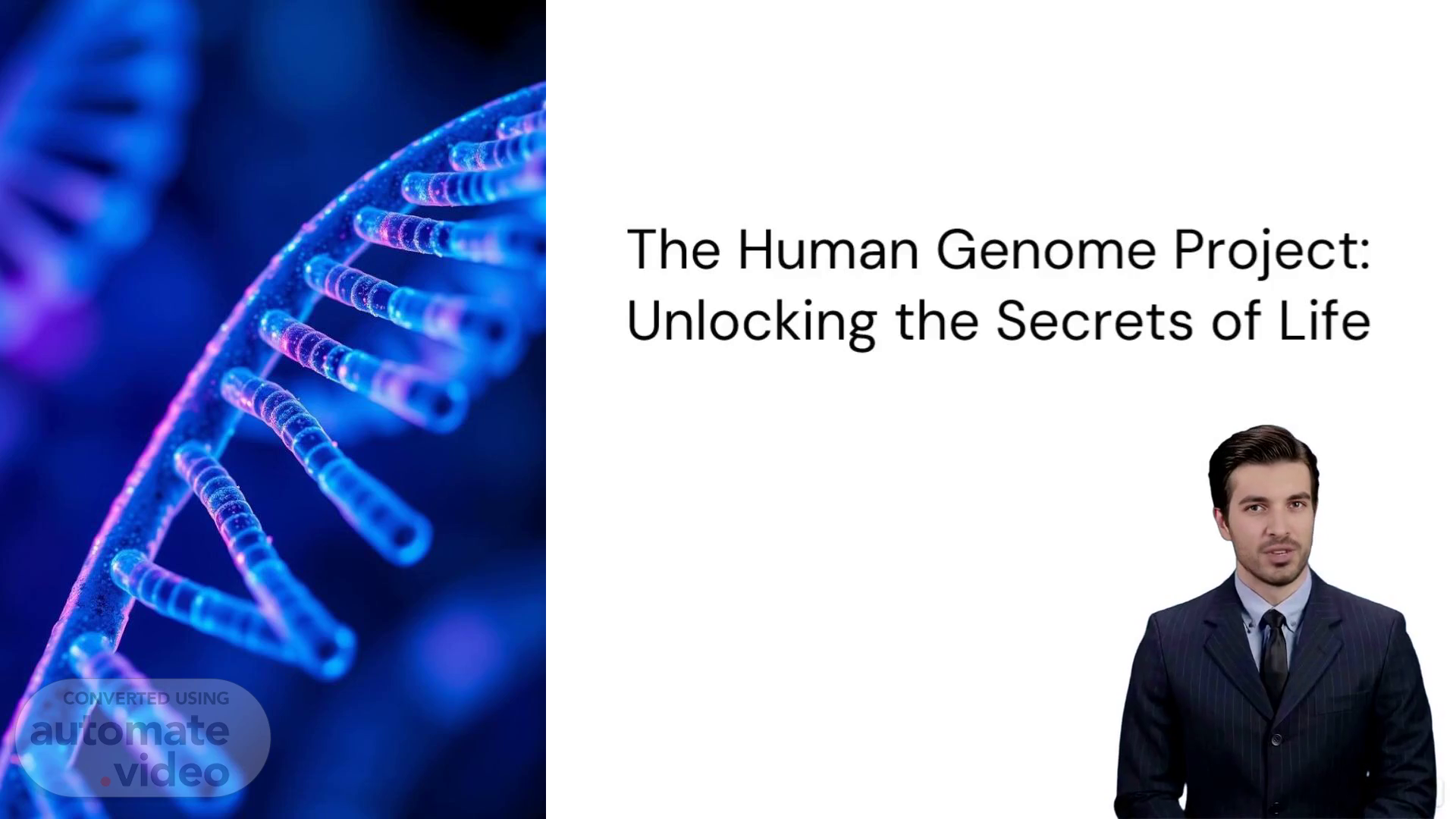Scene 1 (0s)
[Virtual Presenter] The Human Genome Project was a groundbreaking endeavor that sought to decipher the mysteries of life by mapping and understanding the complete human genetic code. This monumental achievement has opened doors to new avenues of research in medicine, genetics, and our comprehension of human biology..
Scene 2 (20s)
[Audio] The Human Genome Project was a comprehensive mapping effort. Its goal was to identify and map all the genes in human DNA, which consists of more than three billion base pairs. This massive undertaking drove significant technological advancements..
Scene 3 (39s)
[Audio] Advancing medicine, mapping the human genome has revolutionized our understanding of genetic disorders, enabling personalized therapies. This breakthrough has opened doors to more effective treatments and improved patient outcomes. Furthermore, the genome provides valuable insights into human evolution, shedding light on our connection with other species..
Scene 4 (1m 2s)
[Audio] The Human Genome Project was launched as an international scientific collaboration, marking a significant milestone in its journey. As the project progressed, it reached another major milestone - the completion of the sequencing process. With over 99% of the genome accurately mapped, the project had achieved its primary objective.
Scene 5 (1m 24s)
[Audio] Sequencing the human genome consisted of two crucial stages. Firstly, researchers employed shotgun sequencing to divide the genome into smaller segments, sequence each segment, and subsequently reassemble the entire genome. This method permitted us to construct a detailed representation of the human genetic code. Secondly, advanced bioinformatics tools were developed to process, analyze, and interpret the immense volume of genomic data produced through this process. These technological advancements enabled scientists to derive valuable conclusions from the data and achieve substantial breakthroughs in our comprehension of human biology..
Scene 6 (2m 6s)
[Audio] Overcoming technical obstacles was a significant hurdle in the Human Genome Project. Limitations in DNA sequencing technologies and computational power had to be addressed. Additionally, unraveling the intricate structure and function of the human genome demanded creative solutions. Furthermore, ethical considerations played a crucial role in the project's success..
Scene 7 (2m 32s)
[Audio] Genetic diagnostics have enabled us to develop genetic tests that identify disease risk and guide personalized treatments. This allows doctors to tailor their approach to each patient's unique genetic profile, resulting in more accurate diagnoses and targeted therapies. We can thus better understand the genetic basis of diseases and develop more effective, tailored medications..
Scene 8 (2m 58s)
[Audio] The concerns about the potential misuse of genetic data include the risk of genetic discrimination. This raises important questions about privacy and data protection. The project has also sparked debates about the ethical boundaries of genetic manipulation and human enhancement. Moreover, ensuring affordable and equitable access to genetic technologies and therapies remains an ongoing challenge..
Scene 9 (3m 27s)
[Audio] As ongoing research progresses, it aims to utilize genomic data to create more targeted and personalized treatments and prevention methods. This precision medicine approach enables the development of more effective therapies tailored to an individual's unique genetic profile. Emerging technologies such as CRISPR also hold great promise for direct DNA modification, opening doors to new possibilities in genetic engineering. Moreover, genome analysis can provide valuable insights into human evolution, migration patterns, and ancestral relationships, shedding light on our complex history..
Scene 10 (4m 6s)
[Audio] The Human Genome Project has had a profound impact on our understanding of human biology. As we continue to analyze the vast amounts of genomic data generated by this project, we're uncovering new insights into the intricacies of human health and disease. Researchers are now using this knowledge to develop targeted treatments and preventive measures, revolutionizing the field of medicine. Moreover, the project's findings have shed light on our evolutionary history, providing valuable clues about how humans came to be what we are. And finally, the technological innovations born from this project have given rise to new industries and applications, such as gene editing and synthetic biology. These advancements hold immense promise for improving human life and pushing the boundaries of scientific discovery..
